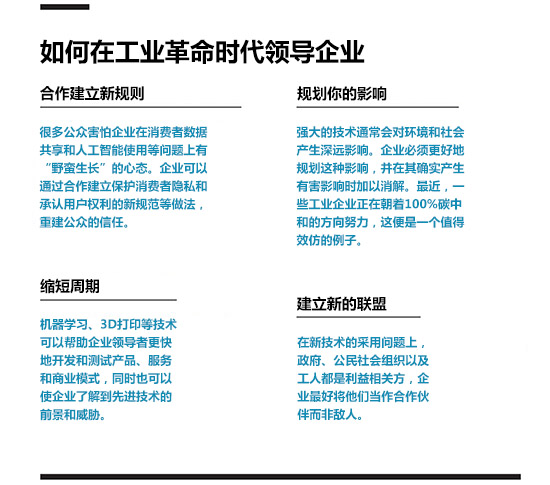赢得第四次工业革命的四种方法
|
在刚刚结束的一年里,无数事件已经表明,新技术正在迅速而深刻地改变着我们的世界——这个过程既充满希望,又潜藏着威胁。
比如说,光是在最近几个月,Alphabet公司的Waymo部门便推出了美国的首个商用无人驾驶出租车服务;中国新华社打造出了世界第一位人工智能新闻主持人;洛克希德马丁公司则开始用3D打印技术为F35战斗机制造零件。
与此同时,因为不法分子使用社交媒体平台操纵选举、煽动暴力,一些社交媒体公司遭受了严格审查。还有一些全球最大的面向消费者的企业遭遇了数据泄露事件,影响了数以亿计的用户。另外,新技术使这个世界的富者更富,分配不均日益加剧,而广大“无产阶级”在经济和社会不安全感的折磨下,变得愈加仇富。
这些事件提醒我们,我们正在经历的变革已经不再局限于商业范畴,它们代表了第四次工业革命的来临。
这场革命正在彻底改变世界,其意义不亚于19世纪至20世纪的第一次和第二次工业革命。在前两次工业革命时期,最领先的技术是蒸汽技术、电力、火车和汽车。从20世纪60年代开始,我们迎来了以计算机为核心的第三次工业革命。前两次工业革命揭开了美国的“镀金时代”,而我们也从中发现,真正革命性的技术,远不止一套机器或工具那么简单,而是能够改变整个社会内核的强大驱动力。
事后看来,有人可能会以为,那些革命性时代的转型过程是平稳的,而忘记了随其而来的痛苦乃至暴力式的颠覆。然而每一次革命在带来进步的同时,也总会产生痛苦和冲突,第四次工业革命也不会例外。它带来的变革会快速蔓延,辐射全球,影响不计其数的人口。
随着时间进入2019年,为了广大企业的自身利益,同时为了社会的利益,我们应该更加积极主动地参与到塑造第四次工业革命的进程中。如果放任自流,到时技术便会来塑造我们。在这个人工智能崛起和“独狼”式袭击者横行的时代,安全风险也要比以往任何时候更高。为了抵御第四次工业革命的负面冲击,我提出以下四点建议。
首先,企业界必须积极开展合作,围绕新技术建立新的规范。无论是就用户数据的所有权问题,还是在城市道路上投放无人驾驶汽车问题,抑或是人工智能、基因编辑和知识产权等问题,总而言之,企业都要与其他利益相关方进行协商。这些规范应该建立在自由和自主原则的基础上,比如说,用户应该拥有自己的数据的所有权,能够不受限制地转移这些数据,而人工智能和广告定位则应该尊重某些隐私的边界。
企业如果不能就此采取行动,则有可能搬起石头砸自己的脚。目前,各国政府和公民社会都已经表明了态度,他们不会容忍借第四次工业革命搞“野蛮生长”的商业行为。如果企业不进行适当的自我监管,政府就会出台更多监管。与此同时,国家机关与个人也要扮演十分重要的角色。比如,只有立法部门才能通过立法手段,确保新技术创造的财富被更公平地分配。而工人和雇主也要共同努力,在利用科技取代旧岗位和投资培训工人适应新岗位之间找到平衡。
当今世界的基本国际格局是由联合国和布雷顿森林体系塑造的,各国政府及国际组织也有必要对其加以改造。许多基于当前这套国际秩序的规则都需要重写。而这也是马上将于今年1月召开的达沃斯世界经济论坛年会的一个重要议题。
合作并不代表企业不需要竞争、创新和发展。因此,我的第二点倡议是:现在,各行各业的企业领袖需要更多更快地进行试验。有了机器学习和3D打印等新技术和新工具的帮助,企业可以利用实时收集的数据和反馈,持续测试新产品,适应新技术,从而为企业带来了巨大的商机。 |
We’ve just concluded a year in which countless events demonstrated how rapidly and profoundly new technologies are changing our world—in ways both promising and threatening.
In recent months, to give just a few examples, Alphabet’s Waymo division launched America’s first commercial self-driving taxi service; China’s Xinhua News introduced the world’s first A.I.-powered news anchor; and Lockheed Martin began 3D-printing parts for its F-35 fighter jets.
At the same time, social media companies came under scrutiny, as bad actors misused their platforms to hijack elections and incite violence. Some of the world’s largest consumer-facing companies fell victim to data breaches affecting hundreds of millions of customers. And as new technologies helped the world’s richest people become wealthier than ever, inequality increased, and a disaffected “precariat”—racked by economic and social insecurity—turned its back on elites.
These events remind us that the changes we’re experiencing go beyond business as usual. Indeed, they represent a Fourth Industrial Revolution.
This revolution is transforming the world as thoroughly as the 19th-and 20th-century Industrial Revolutions did. Back then, the cutting-edge technologies were steam technology and electricity, trains and cars. Beginning in the 1960s, we saw a third such revolution, with computing at its center. From the first two revolutions, which led to the Gilded Age in America, we know that truly transformative technologies are far more than sets of machinery or tools. They are powerful actors that can change the very core of society.
In hindsight, one can see those transformative eras as smooth evolutionary journeys and forget the rough and even violent disruptions that came with them. But each revolution generated pain and conflict along with progress, and the Fourth Revolution will do the same. The changes it is creating are fast-moving and global, and they will affect governments, civil society, and huge swaths of the population.
Going into 2019, it is in businesses’ self-interest and for the greater good that we shape this Fourth Industrial Revolution more actively. Left unmanaged, technologies will shape us, and in the age of A.I. and malicious “lone wolves,” the risk of harm is greater than ever. To counteract it, I propose four points of action.
First, businesses must proactively collaborate to create new norms around technology. Whether in forming agreements about customer-data ownership, the right way to unleash driverless cars in city streets, or rules around A.I., gene editing, or intellectual property, businesses must engage with other stake- holders. Principles of freedom and autonomy can underpin those norms: Users should own their data and be able to transfer it without restrictions, for example, and A.I. and ad targeting should respect certain privacy boundaries.
Companies that fail to act risk shooting themselves in the foot. Already, governments and civil society are showing they will no longer accept business behavior that treats the Fourth Industrial Revolution as a latter-day Wild West. Expect more regulation if companies don’t move to sensible self-regulation. That said, state actors and private individuals have important roles to play. Only legislatures, for example, can enact laws that ensure a fairer redistribution of the riches new technologies bring. Workers and employers together need to find the balance between implementing tech that displaces jobs and investing in retraining for new ones.
Governments and international organizations also need to reinvent the United Nations and Bretton Woods framework that shaped the world we live in. Much of that international rules-based order needs a reboot. This will be a major topic at the annual meeting of the World Economic Forum (WEF) in Davos, later in January.
Cooperation doesn’t absolve companies of the need to compete, innovate, and evolve. Hence, my second point of action: Now’s the time for business leaders of all stripes to experiment more and faster. Companies have a tremendous opportunity to continuously test and adapt new products and technologies because they can utilize data and feedback gathered in real time— with the help of new tools like machine learning and 3D printing. |

|
第三,企业需要采取适当战略,应对新技术带来的风险。比如世界经济论坛的《全球风险报告》反复指出,大范围的网络攻击很有可能发生,其影响将是非常严重的,而大多数企业仍然没有做好应对这些攻击的准备。在2019年,如果这些企业不去彻底地、结构性地解决这些风险,届时很可能会后悔莫及。
最后,企业领导者必须深入了解大环境,以及他们的行为可能导致的意外后果,并相应地进行战略调整。环境污染、社会动荡等外部因素与所有企业息息相关,企业再也不能表现得好像这些与他们毫无关系一样。
总之我们应该明白,第四次工业革命不只会影响我们的工业,而且会影响整个社会,影响全世界人民的生活。企业应该确保社会能够从科技创新中受益。就让2019年在这方面带来新的曙光,让它成为我们对新时代的共同宣言!(财富中文网)
本文作者克劳斯·施瓦布是世界经济论坛创始人、主席。
本文的另一版本刊载于2019年1月刊的《财富》杂志上,题目是“为什么企业必须站出来塑造下一次工业革命”。 译者:朴成奎 |
Third, businesses need to adopt adequate strategies to respond to technology-driven risks. The WEF’s Global Risks Report has shown time and again that widespread cyberattacks are both likely and very impactful, for example, but most companies aren’t well equipped to handle them. In 2019, companies may well regret it if they don’t address such risks in a thorough, structural way.
Last, business leaders must do more to understand the wider context in which they operate and the unintended consequences their actions may have, and revise their strategies accordingly. No longer can businesses act as if externalities such as environmental damage or social unrest don’t exist or aren’t their responsibility.
Through it all, we should understand that the Fourth Industrial Revolution will affect not just our industries but also society and the lives of people everywhere. Businesses need to make sure society benefits from technological innovations. Let 2019 be a new dawn on this front. Let this be our joint pledge for a new era.
Klaus Schwab is the founder and chairman of the World Economic Forum.
A version of this article appears in the January 2019 issue of Fortune with the headline “Why Business Must Step Up To Shape The Next Industrial Revolution.” |













